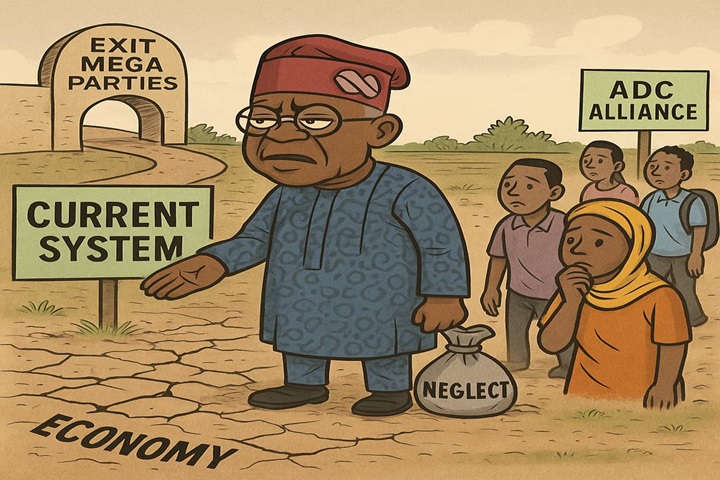As economic hardships and elite capture intensify in Nigeria, a new political consciousness emerges.
It aims to break away from mega parties and develop a leadership model focused on service, inclusion, and accountability.
This shift reflects a desire for genuine change, emphasizing the importance of responsible governance and community focus.
Meanwhile, the movement quietly gains momentum in a nation burdened by decades of underperformance and entrenched elites.
It challenges established parties by rejecting recycled cabals and prioritizing people-first governance.
As these efforts grow, they inspire hope for a more transparent and accountable political future.
Nigeria, rich in talent, resources, and potential, craves leadership that puts the country above personal interests, policies above politics, and citizens above power.
For over twenty years, the duopoly of APC and PDP has shaped our political landscape; yet, poverty, insecurity, and infrastructural decay persist stubbornly.
Consequently, a shift is underway: more individuals are leaving the traditional mega-party machinery, and emerging coalitions such as the ADC symbolize hope for ideological renewal and alternative governance pathways.
Beyond Power for Power’s Sake
The problem with Nigeria’s political establishment isn’t just mismanagement; it’s the recycling of cabals whose only loyalty is to their own preservation.
They jump parties at will, promise reforms during campaigns, then retreat into luxury and detachment once elected.
Their definition of success? Winning elections, consolidating power, and securing influence — not improving roads, building schools, or making food affordable for everyday Nigerians.
This culture of elite recycling has poisoned the political space, stifled innovation, and alienated the Nigerian youth — who now see public office not as a calling, but as a rigged system reserved for the well-connected.
A New Path through Coalition and Purpose
As mega parties lose credibility, smaller and more purposeful political platforms are increasingly gaining traction.
The African Democratic Congress (ADC), in particular, has taken bold steps to actively engage disenfranchised citizens while building strong grassroots movements.
Additionally, it strives to collaborate with like-minded parties to form a viable third force, aiming for meaningful political change.
This alliance isn’t just about elections — it’s about reconstruction.
It’s about building trust, decentralizing leadership, and enabling communities to determine their own destinies.
It’s about tearing down the gatekeeping mechanisms of traditional politics and replacing them with transparency, accountability, and inclusion.
The Tinubu Administration: Between Reform and Regret
President Bola Ahmed Tinubu inherited a fragile economy, with a restless nation eager for change and stability.
Consequently, his initial actions, such as removing the fuel subsidy and unifying the exchange rate, aimed to promote long-term stability.
Many experts and economists had long recommended these policies, and they gradually gained support as strategic steps for economic reform.
However, when policy implementation lacks compassion, it can become harmful or even cruel.
For instance, the abrupt removal of subsidies and deregulation, without a strong social safety network, worsened inflation and increased costs for food and transport.
As a result, millions face greater hardships daily IN Nigeria, struggling to meet essential needs amid ongoing economic challenges.
Though the floating naira is theoretically advantageous, it has, in reality, drastically decreased the purchasing power for workers and small businesses.
Most troubling is the persistent gap between government policies and citizens’ everyday realities.
Despite reforms severely impacting household incomes, the government’s responses have been slow, unclear, and poorly communicated.
Consequently, public trust erodes, and social cohesion becomes more strained during this economic crisis, threatening national stability and unity.
The Neglect of the Citizenry
It is one thing to debate macroeconomics in Abuja; it is another thing to buy garri in Gwagwalada, or diesel in Maiduguri.
While policymakers talk of billions saved from subsidies, the average Nigerian is asking one simple question: How does this help me today?
Schools are underfunded. Hospitals lack basic supplies.
The streets are unsafe. And still, citizens are expected to tighten their belts while their leaders fly private jets and host luxury retreats.
This glaring inequality — between ruling elites and suffering citizens — is no longer sustainable. It is not only unjust; it is dangerous.
What Must Be Done
We must move from noise to nuance, from strongmen to statesmen, from recycled rulers to responsive leaders. The road ahead requires:
Rejecting the cabals who have held Nigeria hostage for decades.
Building broad opposition coalitions driven by competence and compassion, not ego or entitlement.
Investing in youth leadership, women inclusion, and community representation in political spaces.
Redesigning governance to decentralize power, empower states and local governments, and create jobs through regional development.
Most importantly, we must remind ourselves that leadership is not a reward for loyalty, but a responsibility to serve.
Those who seek power must be those ready to sacrifice, listen, and labor for the people.
The Moment Has Come
The winds of change are blowing, softly but surely. Nigeria and Nigerians — young and old, rich and poor, North and South — are tired of the same faces with the same failures.
They are ready for something different. Something honest. Something human.
The path forward will not be easy, but it is necessary.
The choice is ours: recycle yesterday’s politicians or reimagine tomorrow’s nation.
History is watching. The people are waiting. And the time to act — boldly, wisely, together — is now.







